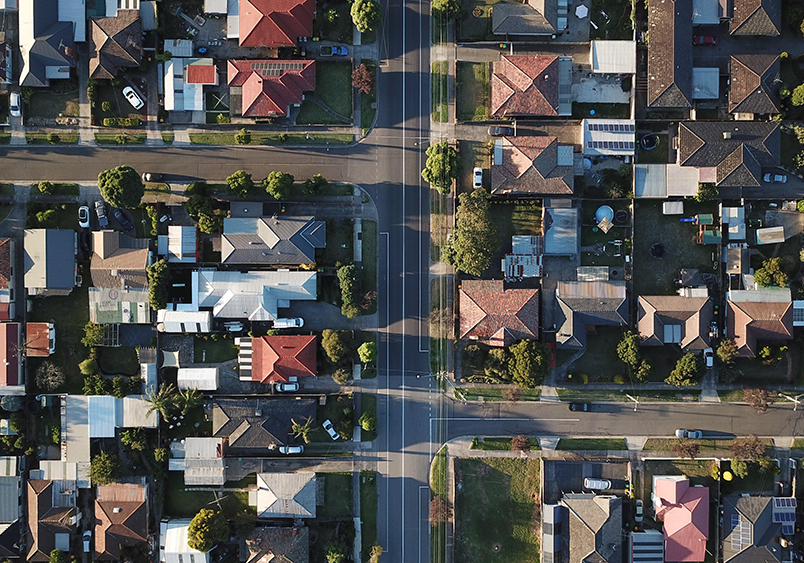Housing crisis underpinned by staggering backward trend in basic shelter for Australians


- The Social Progress Index ranks 168 countries across more than 99.97% of the world’s population
- Australia’s state by state results released
- Housing affordability and insecurity highlighted as our most challenging issues
- Data shows COVID-19 lockdowns affected educational outcomes, personal freedoms, and inclusiveness
- The Social Progress Index is Australia’s only practical tool to track community wellbeing over time, guiding policymaking and investment decisions
Accessing adequate housing is the biggest concern facing most Australians, according to the latest report card tracking key global indicators for health, housing, education and wellbeing.
Launched by the Centre for Social Impact, the latest release of the Social Progress Index reveals a worrying backward trend in providing housing for our most disadvantaged.
While most jurisdictions showed overall improvement across the index in 2021, all states and territories except Victoria went backwards in providing adequate housing as measured through uptake of homelessness services, social housing tenancy rates and demand, overcrowding, and rental affordability in low-income households.
The results also mark the effect of COVID-19 lockdowns in reducing access to education, with 2021 scores tracking worse than pre-pandemic years, particularly for Victoria and NSW where lockdown measures were particularly severe.
Using a global model steered by leading figures from Harvard Business School and MIT Sloan, the Australian Social Progress Index is based on data from authoritative sources including the Australian Bureau of Statistics, the Australian Institute of Health and Welfare, NAPLAN and the Household, Income and Labour Dynamics in Australia survey (HILDA).
Produced by the Centre for Social Impact, the Australian Social Progress Index gives each state or territory a performance score, tracking its social progress over time. Categories include basic human needs, such as shelter, medical care, water, sanitation and personal safety, as well as access to basic knowledge, advanced education, personal rights and environmental quality.
Professor Danielle Logue , Director of the Centre for Social Impact UNSW, says the Australian Social Progress Index is the only tool that holistically measures our country’s social equity, and findings can help guide current and future decision-making.
“The Social Progress Index is a globally respected tool which pulls together multiple streams of data to understand complex social problems in a clear way, showing how our society is faring and importantly, where we are letting people down,” she explains.
“It’s critical for decisionmakers to see the full picture when designing policy to target our most pressing social challenges. While some of these findings are related to specific policy measures taken in 2021 like lockdowns, they paint a worrying picture of a fragmented country where your health, welfare and happiness can be heavily influenced by your location.”
In the latest overall scores, the ACT continues to rank first, followed by Victoria and New South Wales. Western Australia and the Northern Territory historically score lower due to a combination of barriers including remoteness, smaller populations, and higher proportions of First Nations people – further demonstrating the need for more targeted policy and investment to create better outcomes for these communities.
Key results from the current Australian Social Progress Index are shown below.
OVERALL | SHELTER | PERSONAL SAFETY | HEALTH AND WELLNESS | ACCESS TO BASIC KNOWLEDGE | ACCESS TO ADVANCED KNOWLEDGE | |
1st | ACT | NT [i] | ACT | VIC | ACT | ACT |
2nd | VIC | VIC | VIC | ACT | TAS | VIC |
3rd | NSW | WA | SA | NSW | QLD | NSW |
4th | SA | NSW | TAS | WA | SA | QLD |
5th | QLD | ACT | QLD | SA | VIC | WA |
6th | TAS | SA | NSW | QLD | WA | NT |
7th | WA | QLD | WA | TAS | NSW | SA |
8th | NT | TAS | NT | NT | NT | TAS |
The Centre for Social Impact’s Chief Executive Officer, Arminé Nalbandian, says the index provides a way for decision makers to understand existing policy gaps and find opportunities to improve Australians’ wellbeing.
“The Social Progress Index supports the Federal Government’s commitment to ‘measure what matters’, enabling governments to better understand the living reality for people across Australia,” Ms Nalbandian said.
“Drawing on the strongest available data sources, the index shows us where policy decisions are not landing with the communities they are meant to serve. This tool can help focus government efforts across the country on the policy and structural changes needed to drive change.”
The global Social Progress Index is published by the US-based Social Progress Imperative, which guides policymaking and investment decisions. Australia currently sits in 12th position overall among 168 countries, but ranks first globally for access to advanced education. To access the complete Australian Social Progress Index, use the interactive map here .
[i] Based on available data from Australian Institute of Health and Welfare (2021)
Media enquiries: Georgi MacDiarmid, 0402 402 426
